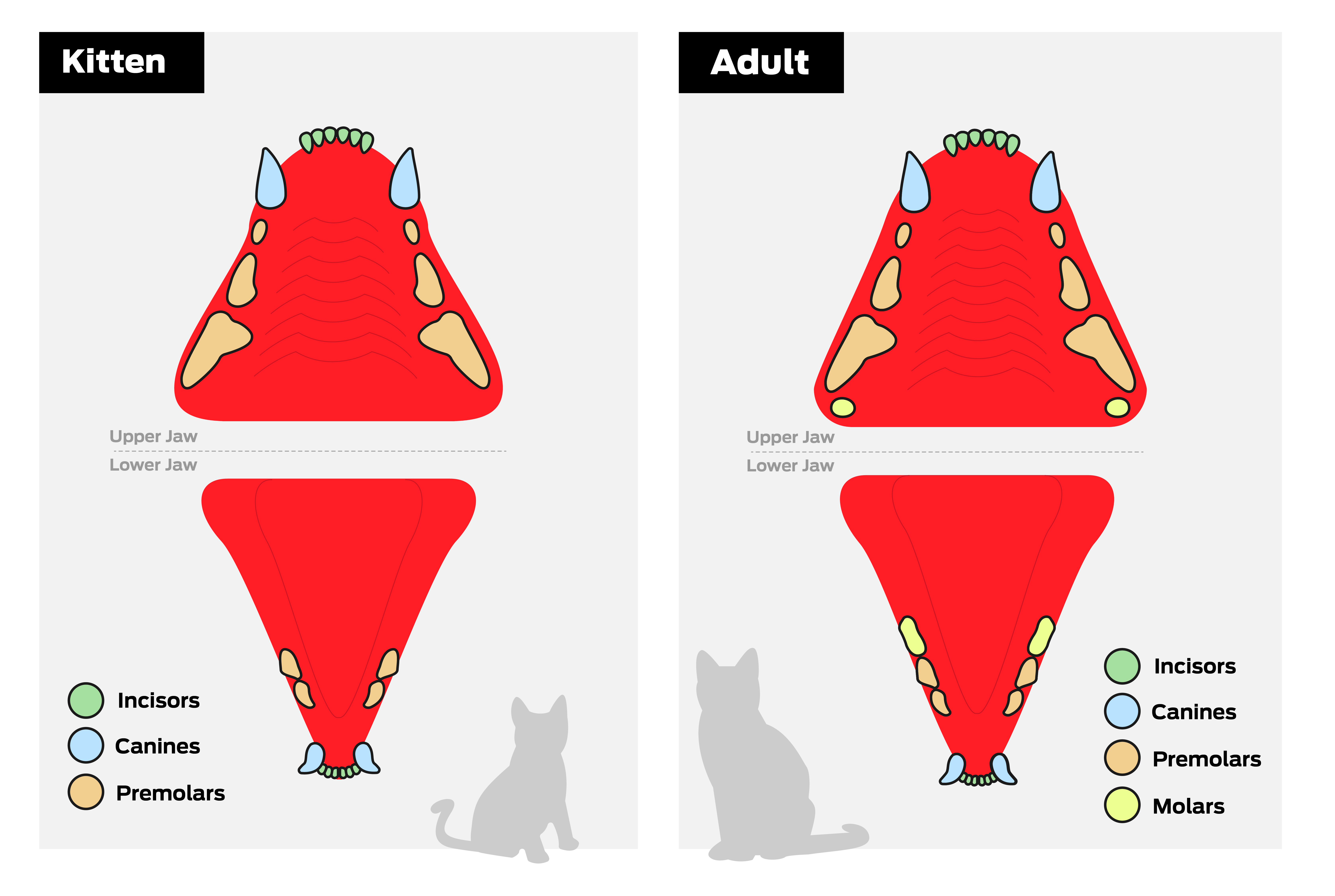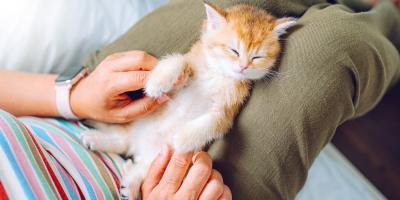
Kitten Teething: Everything You Need to Know


Just like humans, kittens teethe, too. They first get 3-week-old kitten teeth and then lose them to form adult teeth. And again, like humans, the process of growing new teeth is called teething. When their tiny teeth cut through their gums, it might cause some discomfort. But kitten teething isn’t cause for major concern. Like most things in this stage of your kitten’s life, it’s a phase.
In this article, you’ll learn why a kitten teethes as well as the age range for when a kitten starts teething. You can get helpful tips for kitten teething relief as well as information about what happens when your kitten’s teeth are falling out. The kitten teeth chart in this article will also provide a close look at the teeth growing inside your cat’s mouth which is a great resource to have on hand if you’re dealing with a teething kitten.
Why Do Kittens Teethe?
Teething is a normal process for kittens. They must first develop baby teeth which are also known as kitten milk teeth or deciduous teeth. Eventually, though, kitten milk teeth will fall out to make way for their adult teeth. So, if you’re wondering, Do kitten teeth fall out?, the answer is yes. If your kitten lost teeth around 3 or 4 months of age, rest assured it was all part of the teething process.
When Do Kittens Start Teething?
First, to answer the common question of, How many teeth does a kitten have?, the answer is that a kitten starts with 26 baby teeth and eventually grows 30 adult teeth. Next, if you’re wondering, When do kitten teeth come in?, their baby teeth start appearing around three weeks of age. Once the teeth start to break through and pierce the gums, you may start to see your kitten behaving differently. For example, they might begin to chew things. If you’re worried about what to do for a teething kitten at this stage, don’t fret. This stage is completely normal and shouldn’t be a major cause of discomfort.
Kitten Teething Stages
How long does kitten teething last? The kitten teething timeline below may also be helpful to understand the stages of teething by age. Keep this kitten teeth chart handy, so you know exactly what to expect as your kitten’s teeth develop and how to identify kitten teeth vs. cat teeth.
| Stage | Age | What to Expect |
|---|---|---|
| Stage 1: When does a kitten get teeth? | Birth to 3 weeks old | Kittens are toothless. |
| Stage 2: When do kitten teeth fall out? | 3-6 weeks old | Kittens’ milk teeth start to emerge. |
| Stage 3: When do a kitten’s adult teeth come in? | 6-12 weeks old | Kitten baby teeth fall out. Adult teeth start to emerge. |
| Stage 4: When does a kitten stop teething? | 5-9 months old | Kitten has full set of 30 adult teeth. |
Remember that every kitten is different. The stages and ages associated with them are guides, and you may find that your kitten is following a slightly different timeline.
Kitten Dental Anatomy
You might be asking, What do kitten teeth look like? While you may want to get a peek inside your kitten’s mouth, it’s highly unlikely that your kitten will cooperate. Instead, use the kitten teeth diagram below which will help you get a glimpse of the different types of teeth, such as kitten canine teeth and incisors, that will eventually make up your cat’s full set.

Kitten Teething Symptoms
Regardless of the phase your kitten is in while teething, they may experience discomfort at various points throughout the process. The good news is there are signs you can look out for if you’re wondering, Is my kitten teething? The most obvious kitten teething symptoms are listed below:
1. Your Kitten Has Started to Eat Less
If they are chewing slower than usual, or more tentatively, it could be a sign their gums are hurting. It may be a good idea to pay a visit to your vet, just to be on the safe side, particularly if they also lose weight.
2. Urgency to Chew
Another sign that your kitten is teething is excessive chewing. If your cat or kitten is chewing everything in sight, including its bed, your furniture and its toys, it may be a sign that teething has begun.
3. Inflamed or Sore Gums
As their kitten adult teeth erupt, kittens may experience mild gingivitis and inflamed gums. This can result in kitten bad breath. Teething is likely the cause, but once teething ends, the symptoms usually go away on their own.
Other signs of dental discomfort are drooling, bleeding gums and pawing at the mouth. These can also be signs of other dental conditions, so if you have concerns, be sure to call your vet.
4. Increased Irritability
This is most likely due to sore gums and a sign that your kitten is teething.
How to Help a Teething Kitten
You’ve gained some answers for common teething questions like, How do I know if my kitten is teething? But you may be curious about how you can provide some relief for your kitten during periods of discomfort. Although kitten teething is usually nothing to worry about, you can give your kitten extra support while teething by:
- Taking extra care when playing with your kitten. Don’t pull toys that they have grabbed by the mouth.
- Avoid brushing your kitten’s teeth during this time. You don’t want your kitten to think tooth brushing is painful.
- Feed wet food, so they don't have to chew, or try softening kibble with some water.
- Provide kitten teething toys to satisfy their need to chew. The act of chewing might encourage some relief.
- Removing anything that could be hazardous to your cat’s health. When kittens begin teething, they may try to chew anything and everything in your house. Electric cables may look particularly appealing to your teething kitten, so make sure you hide them. Toxic materials such as plants should also be removed, so if you have any flowers such as lilies or tulips on display, it might be time to take them away. If your cat shows an interest in chewing furniture, try to keep them in another room, as chewing wood can cause splinters.
Kitten Teething Advice for Cat Owners
We’ve tackled a number of teething kitten tips as well as information about the teething process, but here are a few common questions related to kitten teething that may be helpful.
Why is My Kitten Grinding Their Teeth?
Kitten teeth grinding usually occurs when a kitten is experiencing pain. The pain could be due to an underlying medical issue. If your kitten is grinding their teeth, contact your veterinarian.
Why Hasn’t My Kitten’s Deciduous Teeth Fallen Out Yet?
In some cases, kittens will retain a deciduous tooth or teeth. There are steps that a veterinarian can take to address retained deciduous teeth. Kitten baby teeth can be removed by extraction.
Is it Normal for My Kitten to Lose Teeth at Six Months?
If your kitten is losing teeth at 6 months of age, there’s no reason to worry. Give them a few more months to shed their milk teeth. Some cats may need a full nine months to develop their adult teeth.
For more expert tips on your kitten's health, explore our other kitten health articles.

Be Rewarded for Your Purina Purchases
Earn and redeem points for Purina products with myPurina app.






